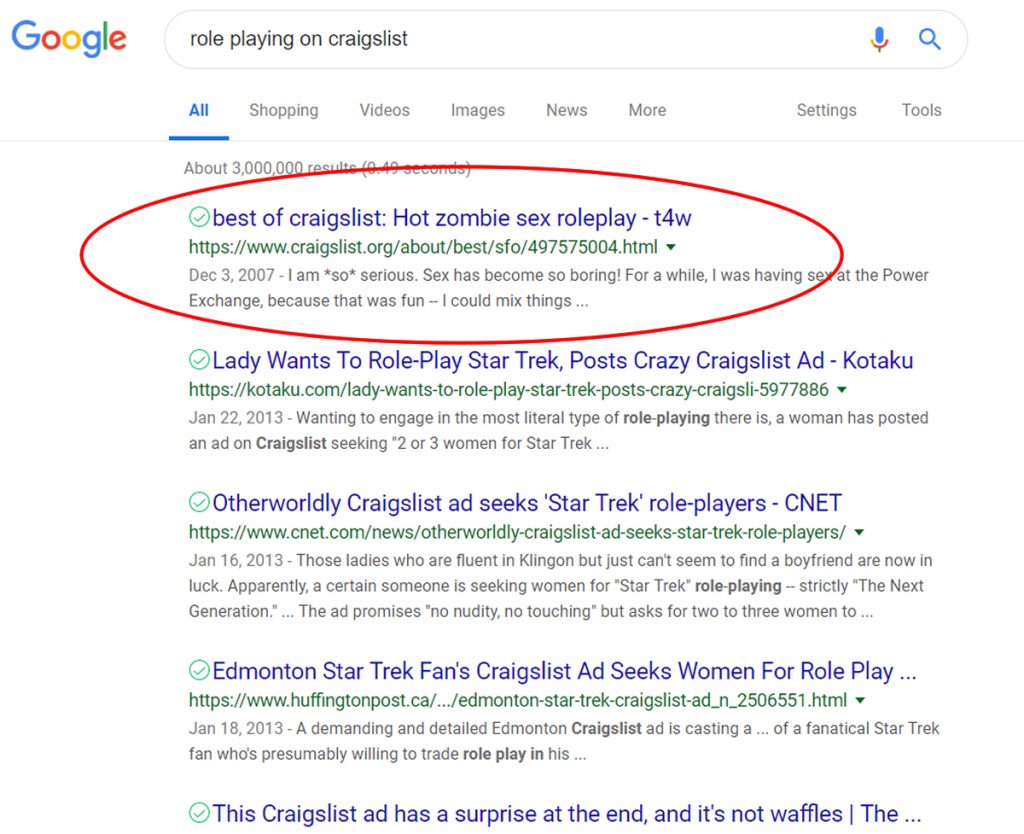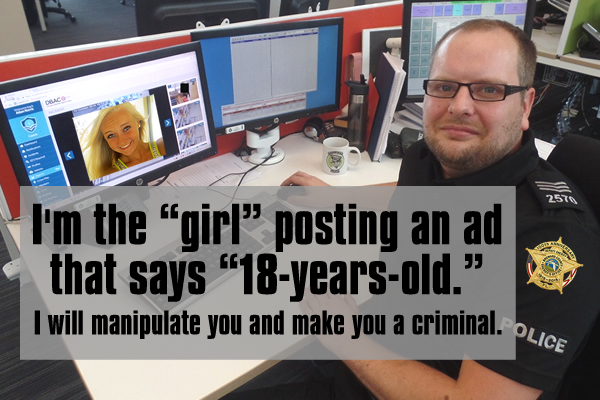Catfishing for Convictions: Florida Police Bend Entrapment Rules?
Man maintains he never committed, nor ever intended to commit, any of the crimes he is charged with perpetrating
St. Lucie County, FL – “Could haves” come in many forms, but what happens when you’re arrested for them and a prosecutor is determined to convict you of serious and felonious crimes that never factually occurred? In fact, what if your “crime” was completely fabricated by the police, who utilized fraudulent means to entrap you? Are you guilty just because government says you could have committed that particular crime? Couldn’t the government make us all criminals using underhanded tactics? One St. Lucie County resident, and many other citizens who’ve been arrested in Florida, are starting to fight back against what they call a government criminal entrapment ring.
What does criminal entrapment mean to you? As defined, “In criminal law, entrapment is a practice whereby a law enforcement agent induces a person to commit a criminal offense that the person would have otherwise been unlikely or unwilling to commit.” In Florida, thousands of people have been arrested and convicted for crimes which they were “persuaded” into committing by law enforcement officers. And entrapment is not solely limited to Floridians.
Of similar importance are juries; jurors determine if an entrapment defense is a valid criminal defense.
Are there crimes where you’d be okay with police using entrapment? The answer to that question poses a clear moral dilemma.
Supreme Court Ruling Quashes Entrapment
Lawyer Craig Klebanoff says, “One famous case where entrapment (defense) did work is Sorrells v. United States, 287 U.S. 435 (1932). Mr. Sorrells was a World War I veteran during alcohol prohibition. His probation officer asked him to buy some alcohol for a “fellow soldier.” Sorrells declined, insisting that he “did not fool with whiskey.” But the probation officer kept asking him over and over and eventually he relented. He was arrested, prosecuted and convicted, but the Supreme Court unanimously overturned his conviction on grounds of entrapment.”
The Supreme Court held that, “… decoys are not permissible to ensnare the innocent and law-abiding into the commission of crime. When the criminal design originates, not with the accused, but is conceived in the mind of the government officers, and the accused is by persuasion, deceitful representation, or inducement lured into the commission of a criminal act, the government is estopped by sound public policy from prosecution therefore.”
The Supreme Court overturned Sorrells’s conviction stating, “The judgment should be reversed and the cause remanded to the District Court with instructions to quash the indictment and discharge the defendant.”
Do Jurors Pick and Choose What Crime(s) Entrapment Applies To?
What if an undercover officer approached an innocent person on the street, built a relationship with that person, then persuaded that same person to forge a signature? Would you find that person guilty? What if that person had not intended to commit the crime of forgery? What if that person never inquired about such crime? What if that person had no prior criminal history and was on the verge of retirement? What if the undercover officer never intended to maintain the relationship with that person beyond conviction?
Obviously, that person is not the smartest if they agreed to forge a signature. But should they be a criminal? Despite the obvious, wouldn’t that scenario be considered entrapment? That is exactly what we asked in a US~Observer poll, in which we found that 40 out of 42 people polled would not convict someone under these circumstances.
But what happens when the “crime” is that of a more sensitive nature?

Proof people role play on Craigslist. Searching Google for: “role playing on craigslist.” The first result: “best of craigslist: Hot zombie sex roleplay”
In a separate poll, based upon the arrest of the St. Lucie County resident, we asked:
“Would you convict an adult of a sex crime for role playing with someone online who said they were only 15 years old, even though it was an adult law enforcement officer they were communicating with?”
The 42 respondents came back with an astonishing 30 people wanting to convict. It appears that even though the set-up is the same if not even more egregious, the nature of the act makes people react with more persecution. But would more information change minds?
We followed up with the 30 respondents who wanted to convict:
“Would it change your mind to know this individual had gone onto a site where there shouldn’t have been any underage people at all; that it was an adult’s only site; that this individual answered a posting which was presumed to have been put there by an adult; that there was never any intent to seek out a 15-year-old? Would it also affect your decision to know this individual had no criminal history during their extensive life? And, most importantly, they never actually communicated with a 15-year-old, it was always the adult law enforcement officer – there was never a real crime – and it amounts to nothing more than a thought crime created by a government agent. Would you still want to convict this person?”
Fifteen of the thirty changed their mind but that still left 15 thinking it is okay for the government to entrap an individual as long as it is based upon a made-up sex crime.

This serves to show how so many innocent victims of false sex charges have found themselves behind bars; many jurors just can’t get beyond their emotions to see that there was factually no crime committed when law enforcement prods a person through fraudulent means to comport themselves in a manner they would not have normally acted, especially when there was no intent at the outset.
The St. Lucie County Floridian not only initially lost their freedom, that person also lost a job of over 25 years. That person lost their retirement. That person lost their reputation. And, it was all because of an innocent “click” responding to an adult ad, on an adult only website, that specifically stated the advertiser was “18 years old.” The presumption of innocent until proven guilty went out the door in this case. All of this happened before trial.

While the case above has yet to be set for trial, this person is not the only one to have been ensnared during the St. Lucie County Sheriff’s Department’s “Operation Guardian Angel” sting. In fact, there are other stings across Florida and the U.S. with hundreds, if not thousands having been duped by law enforcement to participate in fraudulent criminal constructs designed to convict people who most likely would have never committed a crime, and technically never did.
Here we are back to the age-old question; is it okay to convict the innocent if it means we get a few truly guilty people along the way? The US~Observer believes any innocent convicted is one too many.
Several people we polled responded to us with further questions; one great question was mirrored by several people: “whatever happened to catching someone in the act of a crime that wasn’t solicited by law enforcement?” In short, the answer to that is simple. It’s money.
There are many examples of why police use “stings” to secure convictions. As with most things that sound sketchy within government, we followed the money. It’s no secret either. The amount of funds gained by law enforcement agencies across the U.S. can be, and often are, inspired by convictions.
Grant writers within police agencies gain funding for specific criminal convictions/arrests. Basically, if a law enforcement agency gains X amount of convictions for a particular crime, they will receive X amount of government funds to be used for that specific conviction/arrest. Some call this “filling quotas.” Some call it “cash for convictions.” Despite what it’s called, it is real. And grant money isn’t the only incentive. Asset forfeiture is another incentive. When police arrest someone, they often seize what property was deemed to be used during the commission of the crime. Initially intended to thwart drug dealers, asset forfeiture has become commonly used for other purposes. Vehicles are often seized, as is cash and other personal property. Law Enforcement in the United States earns an estimated 12 billion in asset forfeiture annually, according to Wikipedia.
Operation Guardian Angel and others…

Polk County Sheriff Grady Judd
It’s no secret that law enforcement agencies across Florida conduct sex crime sting operations. They give these sex sting operations fancy titles like, “Operation Guardian Angel.” And it works. The public often eats it up. One elected Sheriff who conducts sex stings, Sheriff Grady Judd of Polk County says his officers use social media sites to find alleged sex criminals. During a press conference Judd said, “but what we used was sites that children would be on.” This, however, is not always the truth.
Entrapment by Law Enforcement
What people are unaware of is many of those arrested thought they were going onto an adult only website, where they intended to meet other adults. In fact, Craigslist, which several of these stings have been conducted on, specifically stated, “By clicking on the link below you confirm that you are 18 or older and understand that personals may include adult content.” Craigslist went even further by stating in their Terms of Use that the following was prohibited:
• Offers of solicitation
• False Content
• Misleading Content
• Deceptive Content
• Fraudulent Content
• Bait and Switch
• Postings… offering… unsolicited services or products
• Any… service… that violates the law or legal rights of others
Craigslist, and other “adult sites” eventually discontinued personals pages because cops were using them to entrap and arrest. Gaining public support was needed for the police to continue these operations. “We must stop human trafficking… We must end prostitution…” Yes, these issues are real, but the secret most don’t know is police knowingly and willingly create criminals while fooling the general public into thinking otherwise.
Adding to the perception that entrapment could be refuted by the prosecution and juries are reports by mainstream media that condone unlawful police behavior. Mainstream media often enhances statements made by law enforcement. They warn parents of the predators that loom… And, the relationship between mainstream media and police can and often does hinder the truth. Ratings and arrests drive both entities which makes for a cozy relationship.
Take NBC’s show, “To Catch a Predator” for example. That show no longer exists. One would find it difficult to believe it was because of its high ratings. So why? Like many, I’ve seen the show. It would enrage me that an adult would meet or attempt to meet an under-age person for sexual gratification. But how did this happen? One would believe it was simply adults looking for kids online and the rest is history. But what if that was not true? What if the producers of the show, entangled with police officers, created adult profiles online and then coerced those who responded to engage in behaviors that were not intended?
To Catch a Predator (NBC) was eventually sued for $105 million and settled just months after another lawsuit was filed against NBC. In that suit, the network fired Marsha Bartel, the shows former producer. She alleged the network fired her after she raised ethical concerns about the show’s methods. Could they have been aiding police in entrapment? Sounds good for ratings and arrests. Yes, there are sexual predators, that is not disputed. They should be brought to justice the lawful way. Adults who intend to meet other adults on “adult websites” should not be duped into a relationship by an undercover agent whose only intent, before, during and after is solely to gain a conviction.
Online Is the Top Way People Are Finding Their Spouses Today
Why would police want to entrap those who did not seek to commit a crime in a time where an increasing amount of people are seeking adult relationships online, utilizing websites they believe to be safe? Simple answer: to generate more revenue by gaining more convictions.
It is simple to say, “Don’t be stupid. Don’t engage offers that are not lawful.” For those who say this, you must also know that people are still arrested who ended the conversation(s) at the point the undercover officer’s age was changed to “under 18”. The will to arrest/convict continues, whether you actually met someone, attempted to meet, or otherwise!
One attorney who asked to remain anonymous until a pending case is finished said there is a new case, and separate case law that could help resolve arrests where cops entrapped people on third party websites, like described above. He believes there is still hope for many who never intended to commit such crimes before being persuaded to by undercover adult police agents. He said, “government must first obtain permission to conduct stings on third party websites which they have not obtained in my experience.” Could a loophole like this be the difference?

According to the US Bureau of Justice Statistics, 2,220,300 adults are incarcerated in US federal and state prisons, and county jails. Additionally, 4,751,400 adults are on probation or on parole. Youth incarceration in the United States is estimated at 70,800. These figures do not include juveniles who are on probation. (Source: BJS 2013, wikipedia)
In closing
The U.S. already incarcerates more humans per capita than any other developed country. It is obvious, with allowed entrapment, why that is. Imagine the tax money spent to incarcerate people who had no intent to commit a crime.
Now, most relationships in the United States begin online. Be careful, the next one you start could be with a cop whose sole purpose is to pull on your heart strings while attempting to deceive you into becoming a criminal. And, for those who believe that if they don’t commit a crime, they will have nothing to worry about, remember this – you too could be part of the next big sting…
One thing is certain, police methods have evolved to be the originator of criminal behavior. Despite what someone is arrested for, an entrapment defense is not limited to a specific crime. An entrapment defense should lawfully apply in all cases where someone is unlawfully targeted. Entrapment is a valid defense; the prosecution must show the defendant had a predisposition to commit the crime if it is raised.
Let’s talk about that!
The US~Observer will be publishing a follow-up article once this case concludes.
Editor’s Note: If you, or anyone you know have been wrongfully arrested or convicted, contact us immediately. The US~Observer champions helping those who are victims of injustice. Email: editor@usobserver.com, or call, 541-474-7885.










